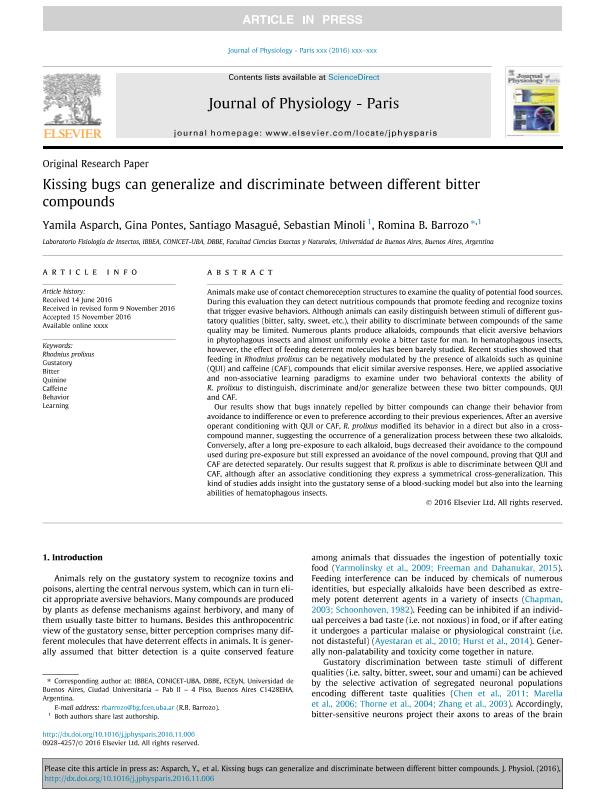Artículo
Kissing bugs can generalize and discriminate between different bitter compounds
Asparch, Yamila Belén ; Barcelos Pontes, Gina
; Barcelos Pontes, Gina ; Masague, Santiago; Minoli, Sebastian Antonio
; Masague, Santiago; Minoli, Sebastian Antonio ; Barrozo, Romina
; Barrozo, Romina
 ; Barcelos Pontes, Gina
; Barcelos Pontes, Gina ; Masague, Santiago; Minoli, Sebastian Antonio
; Masague, Santiago; Minoli, Sebastian Antonio ; Barrozo, Romina
; Barrozo, Romina
Fecha de publicación:
10/2016
Editorial:
Elsevier
Revista:
Journal of Physiology
ISSN:
0928-4257
Idioma:
Inglés
Tipo de recurso:
Artículo publicado
Clasificación temática:
Resumen
Animals make use of contact chemoreception structures to examine the quality of potential food sources. During this evaluation they can detect nutritious compounds that promote feeding and recognize toxins that trigger evasive behaviors. Although animals can easily distinguish between stimuli of different gustatory qualities (bitter, salty, sweet, etc.), their ability to discriminate between compounds of the same quality may be limited. Numerous plants produce alkaloids, compounds that elicit aversive behaviors in phytophagous insects and almost uniformly evoke a bitter taste for man. In hematophagous insects, however, the effect of feeding deterrent molecules has been barely studied. Recent studies showed that feeding in Rhodnius prolixus can be negatively modulated by the presence of alkaloids such as quinine (QUI) and caffeine (CAF), compounds that elicit similar aversive responses. Here, we applied associative and non-associative learning paradigms to examine under two behavioral contexts the ability of R. prolixus to distinguish, discriminate and/or generalize between these two bitter compounds, QUI and CAF. Our results show that bugs innately repelled by bitter compounds can change their behavior from avoidance to indifference or even to preference according to their previous experiences. After an aversive operant conditioning with QUI or CAF, R. prolixus modified its behavior in a direct but also in a cross-compound manner, suggesting the occurrence of a generalization process between these two alkaloids. Conversely, after a long pre-exposure to each alkaloid, bugs decreased their avoidance to the compound used during pre-exposure but still expressed an avoidance of the novel compound, proving that QUI and CAF are detected separately. Our results suggest that R. prolixus is able to discriminate between QUI and CAF, although after an associative conditioning they express a symmetrical cross-generalization. This kind of studies adds insight into the gustatory sense of a blood-sucking model but also into the learning abilities of hematophagous insects.
Palabras clave:
Behavior
,
Bitter
,
Caffeine
,
Gustatory
,
Learning
,
Quinine
,
Rhodnius Prolixus
Archivos asociados
Licencia
Identificadores
Colecciones
Articulos(IBBEA)
Articulos de INSTITUTO DE BIODIVERSIDAD Y BIOLOGIA EXPERIMENTAL Y APLICADA
Articulos de INSTITUTO DE BIODIVERSIDAD Y BIOLOGIA EXPERIMENTAL Y APLICADA
Citación
Asparch, Yamila Belén; Barcelos Pontes, Gina; Masague, Santiago; Minoli, Sebastian Antonio; Barrozo, Romina; Kissing bugs can generalize and discriminate between different bitter compounds; Elsevier; Journal of Physiology; 110; 3; 10-2016; 99-106
Compartir
Altmétricas



